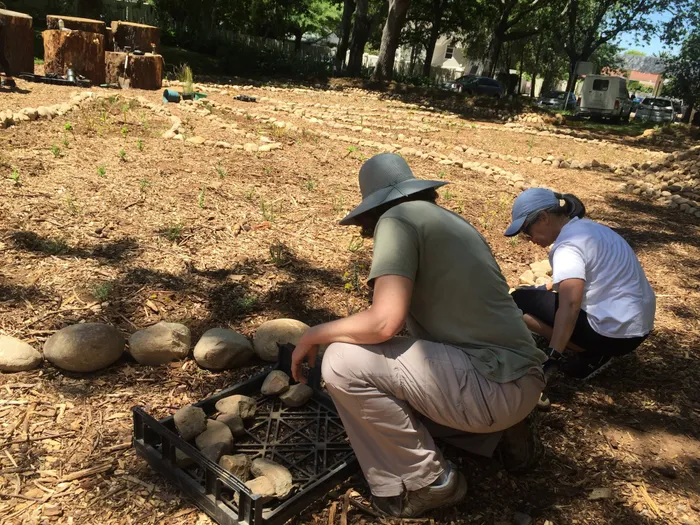Veld circle will be a showcase for local plants

FynbosLIFE volunteers Helen Mitchell, left, and Gayle Sherman working on the site.
Volunteers planting indigenous species at the new rehabilitation site in Newlands’ Papenboom Meadow Forest hope this will be a stepping stone for the public to invest in local plants.
The rehabilitation of the front section of the forest began in late June and is expected to be complete by the end of November.
At the weekend, volunteers were making progress with a “veld circle” design.
The indigenous plants will not be watered and will depend on the natural rainfall.
“The idea of this veld circle is to showcase local forest and fynbos understory plants suitable for shady gardens, community parks and schools in Cape Town,” said programme manager and botanical ecologist Dr Caitlin von Witt from FynbosLIFE, a wildlife NGO.
“The next step of our project is to place educational signs at each plant species.”
Dr Von Witt hopes the public will visit the site and learn about the wild plants and animals and how they have adapted to local soils and climate. Signs will explain how to support wildlife in homes and gardens.
There are at least 30 locally indigenous plant species in the veld circle, and they can be bought at the Cape Flats Fynbos Nursery.
FynbosLIFE project volunteer Helen Mitchell said: “When planting these species, nothing needs to go into the soil because the plants are natural to the area and will adapt and grow without fertiliser or compost.
“The other important aspect of the veld circle is that people will potentially introduce these same local species to their own gardens. This will help to bridge the gap between the high amount of alien invasive plants in our natural environment.”
Invasive plants were a threat to indigenous animal species because they placed stress on their habitats and food sources, she added.
Indigenous trees are expected to be planted at the site next year in July, and the public are encouraged to plant a tree for a loved one they may have lost. For more information, email, caitlin@fynboslife.com

